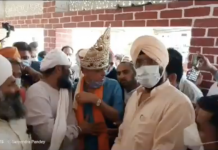

 New Orleans, Louisiana, USA—Last week the Fifth Circuit Court of Appeals heard a major case concerning the clash between religious liberty and federal security policies.
New Orleans, Louisiana, USA—Last week the Fifth Circuit Court of Appeals heard a major case concerning the clash between religious liberty and federal security policies.
The case concerns Kawaljeet Kaur Tagore, an IRS accountant who was fired in July 2006 because she wore a kirpan to work after she received Amrit, the Sikh baptism. The kirpan is a Sikh article of faith that many mistake for a weapon. Baptized Sikhs must wear the kirpan and 4 other articles at all times as if they are a body part. The kirpan is traditionally worn in a curved sheath and acts as a reminder of a Sikh’s duty to protect the weak and promote justice for all
Fired for Her Religion
An arm of the Department of Homeland Security, the Federal Protective Service (FPS) is charged with protecting all Federal buildings. There are cases all over the United States of FPS not allowing Sikhs into Post Offices or Passport Offices. FPS stated that Kawaljeet could not enter the federal building in downtown Houston because she was wearing the kirpan. Her supervisor further objected, even though she claimed it never set off the metal detector in her building, and she was told to work from home. However, after she was ordered to return to work with a blade no longer than 2.5 inches, she still insisted on carrying a kirpan with a minimum 3-inch blade in accordance with her Sikh faith, whereupon security officers barred her from the building, and she was fired soon afterward.
Kawaljeet Kaur’s kirpan was small, yet the FPS allows all kinds of far sharper knives into the Houston federal building, including cake knives, box cutters, and very sharp maintenance tools. In essence FPS and the IRS are saying that having cake at employee birthday parties is more important than the First Amendment right to exercise one’s religion—that disregards the Constitution and the Bill of Rights.
Implying Previous Wrongdoing
In the run-up to their day in court, Federal agencies revealed a new policy that had apparently been in the works for months: not only will there be no categorical ban on religious items like Kawaljeet’s kirpan, but FPS also has to make an extra effort to allow in religious items that pose no danger to federal buildings.
This new policy was embodied in a FPS Directive that went into effect last year but was kept under seal at the government’s request until days ago. The policy contains specific provisions to deal with Sikh religious objects, but it is designed to accommodate all religious groups who do not want to give up their religious identity when they walk through the door of a federal building.
In short, Kawaljeet Kaur—whose lawsuit surely led to the issuance of the Directive—has already won a major victory for the religious freedom of not just Sikh-Americans, but believers of all faiths. The Fifth Circuit appeal was argued by Scott Newar, a prominent Houston civil rights attorney who has been co-counsel with the Becket Fund and the Sikh Coalition in representing Ms. Kawaljeet Kaur.



The Long Road to Justice
The original case was supported by the Sikh Coalition and filed in January 2009. At the time, Harsimran Kaur, the Sikh Coalition’s Legal Director said, “Sikhs should be entitled to work for their government, just like other Americans. In this case, the government put Ms. Tagore in the unacceptable position of choosing between her religion and her job.”
The lawsuit claimed that the government’s conduct violated both the Religious Freedom Restoration Act of 1993 (RFRA) and Title VII of the Civil Rights Act of 1964. It alleges that the FPS and IRS banned the kirpan as a so-called “dangerous weapon,” even though the government allows hundreds of sharp knives and box cutters in the Leland Building. Government officials banned Tagore’s kirpan sight unseen, failing to conduct any examination whatsoever of the kirpan before banning it outright.
Since 2005, the Sikh Coalition represented Ms. Tagore in an internal complaint process related to the discrimination. The next stage in the legal process was the filing of the lawsuit in Houston federal district court. The Becket Fund for Religious Liberty of Washington, DC and Houston civil rights attorney Scott Newar then joined the Sikh Coalition in the federal litigation.
In September 2009, a judge dismissed most of her legal claims, in part because the Title VII claim pre-empted the RFRA claim in some instances. However, Treasury Secretary Geithner was still a defendant in the Title VII claim, as were several officials and employees, along with the Department of Homeland Security and the Federal Protective Service. At this point the The Becket Fund and Sikh Coalition dropped out of the case. The International Center for Advocates Against Discrimination (ICAAD) stepped in along with attorney Scott Newar to represent Kawaljeet Kaur. In 2011 a Judge sided with the IRS and an appeal was filed leading to the hearing on February 10th.
Kirpans on the Job
“Sikhs around the world wear their kirpans while serving as government officials. Bureaucratic short-sightedness and ignorance of the Sikh religion are no reason to put a unique ban on kirpans in Houston,” said Eric Rassbach, national litigation director at the Becket Fund.
Private employers have embraced accommodation of Sikh kirpans across the country.
The International Monetary Fund reversed its ban on wearing kirpans at its Washington, DC headquarters in December 2007. In October of 2007, AT&T Inc. in Ohio also reversed its workplace ban against kirpans at the urging of the Sikh Coalition.
Ms. Tagore’s suit is the first kirpan case by a federal employee against the United States Government.
Kawaljeet Kaur and the Kirpan
Kawaljeet Kaur’s road to becoming a Sikh has been difficult, in addition to this case, she accused Harris County Sheriff’s deputies of harassment in December of 2008 after her family reported a burglary. When the deputies responded to the scene, they overreacted upon seeing Kawaljeet Kaur wearing her kirpan. This led to her family being held at gunpoint and handcuffed for hours while being subjected to derogatory swearing.
[This article was edited on February 19, 2013 to reflect that ICAAD took over the case when Sikh Coalition dropped out.]





guru fateh !!!!